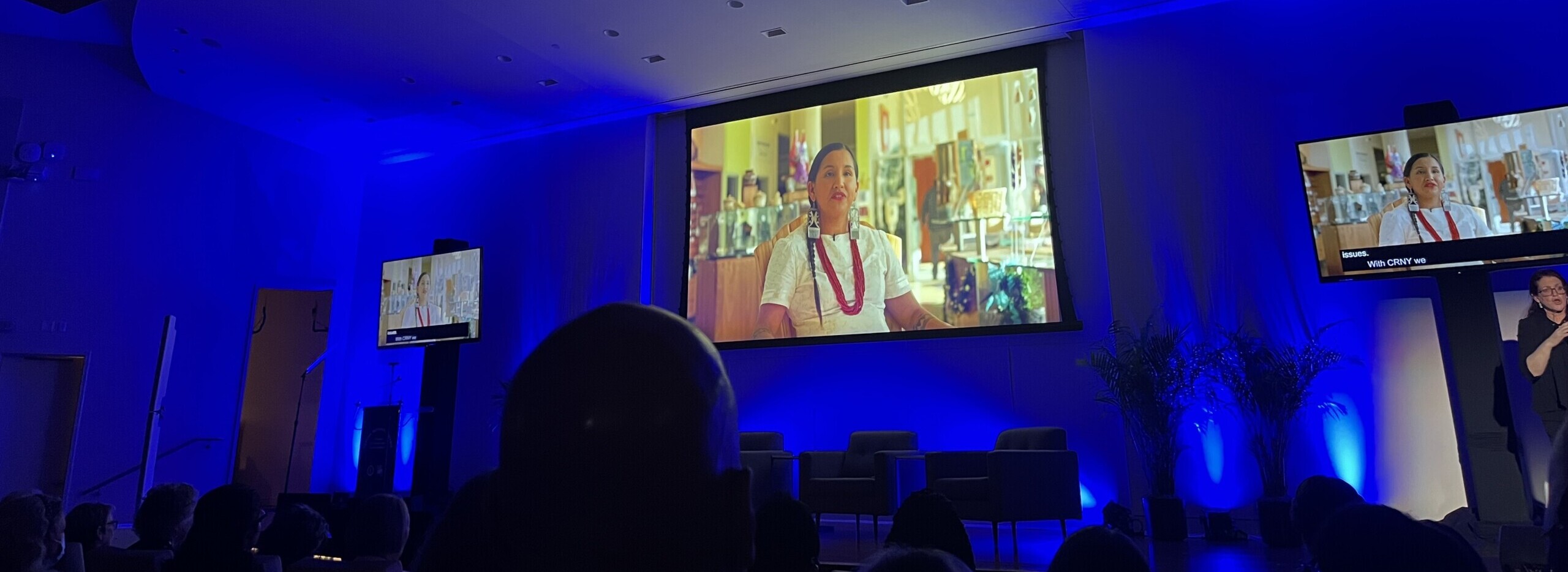Dreaming Big: A Reflection on the 2024 NEA Summit

Last week, CRNY Executive Director Sarah Calderon and I participated in a first-of-its-kind national convening hosted by the White House Domestic Policy Council and the National Endowment for the Arts (NEA). The event, “Healing, Bridging, Thriving: A Summit on Arts and Culture in our Communities,” brought together leaders from across sectors including government officials and policymakers, artists and arts advocates, academics, philanthropic and community leaders, and the public via livestream.
It was exciting not only to get the chance to showcase CRNY’s Artist Employment Program (AEP) to these audiences, but also to witness the deep integration—and celebration—of arts and culture across federal agencies. From U.S. Surgeon General Vice Admiral Vivek H. Murthy to the U.S Department of Labor’s Chief Diversity and Equity Officer Alaysia Black Hackett, our nation’s top leaders and policymakers shared powerful testimony and understanding of the importance of artists to our health, wellbeing, economy, and democracy. Citing President Biden’s description of artists at the 2023 National Medal of Arts ceremony, NEA Chair Maria Rosario Jackson said, “I can’t think of an area of policy or practice that wouldn’t benefit from ‘truth tellers, bridge builders, and change seekers.’ We need arts and humanities more than ever.”
Surgeon General Vivek Murthy went on to describe the importance of artists to healing, and to mitigating the epidemic of loneliness and isolation that plagues our country. “We don’t need medical and nursing degrees to be healers… we can all be part of creating a more connected world,” he said. The CRNY team has seen firsthand how AEP artists are healing communities across New York State, addressing issues like climate change, Indigenous sovereignty, discrimination, gentrification, and more.
Dozens of artists contributed to the convening as performers, panelists, and audience members.When asked what would most support her work, Amanda Phingbodhipakkiya, multidisciplinary artist, educator, and member of the President’s Committee on the Arts and the Humanities responded: “Please pay us fairly and help us sustain our practices. Invest in our humanity and our lives and our artistry, not just in our outputs. That would really open up a lot of possibilities so we don’t have to choose between our heart work, our community work, and what pays the bills.”
On a personal note, I was particularly thrilled to celebrate the announcement made by Radhika Fox, Assistant Administrator, Office of Water at the U.S. Environmental Protection Agency (EPA). In collaboration with the NEA, the EPA is launching the first federal artist-in-residence program in six historically important watersheds to “boost engagement, awareness and participation in critical water challenges ranging from aging infrastructure to climate impacts like flooding and storm surge to investment in safe drinking water.”
Fox shared that her deep commitment to the arts traces back to a partnership between the U.S. Water Alliance and ArtPlace America, where she and I collaborated with artists and environmental leaders across the country to articulate the roles that artists can play in moving the needle on climate and water justice. To have her spread those ideas to the highest levels of government sets the bar not only for other federal agencies, but for state and local governments to follow. What if Governor Hochul’s Arts Pluribus Unum initiative included artists working with the New York State Department of Environmental Conservation?
NEA Chair Jackson urged us last week “to take this moment to dream. To suspend what we’re used to, what’s standard, what’s typical, and to stand in the space of possibility. What if we included arts and humanities in all policies and programs intended to help us deliver on the promise of our nation?” The convening affirmed how the arts can fuel our democracy and create equitable outcomes for our communities in New York and across the country—and perhaps most importantly, that we should dream big.
Click here to watch the archived webcast of the NEA event, “Healing, Bridging, Thriving: A Summit on Arts and Culture in our Communities.”


